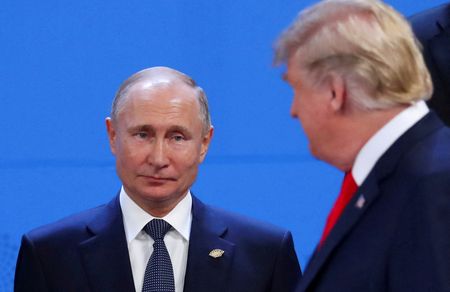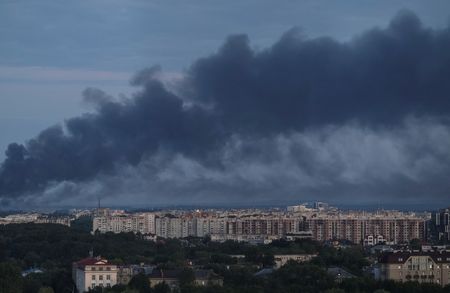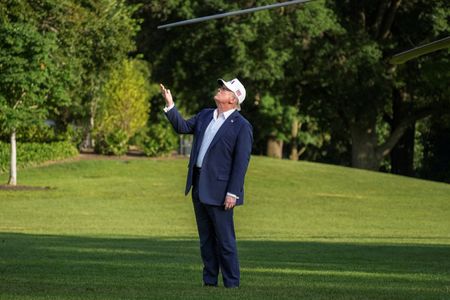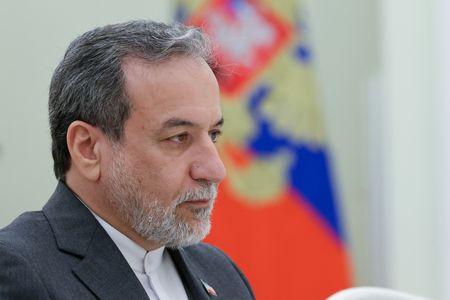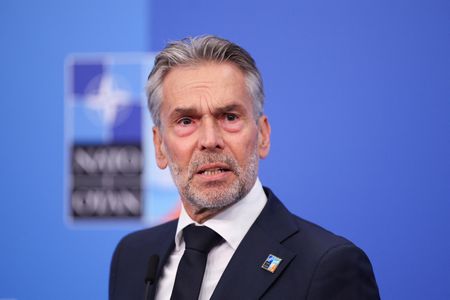By Gram Slattery
WASHINGTON (Reuters) -A bipartisan U.S. bill that would hit Russia with sanctions in a bid to pressure Moscow into good-faith peace negotiations with Ukraine has gained momentum this week in Congress, but it still lacks the presidential push it needs to get over the finish line.
Now, Ukraine’s supporters in Washington and Kyiv, who have for months hoped for President Donald Trump to throw his weight behind the bill, are anxiously awaiting what the Republican president has said will be a “major statement” on Russia on Monday.
Trump, who vowed during his election campaign to end Russia’s invasion of Ukraine, has given no details on what his planned announcement would entail, but over the past few weeks he has grown increasingly and publicly frustrated with Russian President Vladimir Putin over his reluctance to accept a ceasefire and the growing civilian death toll of Russian attacks.
On Tuesday, Trump approved sending U.S. defensive weapons to Ukraine. Two days later, he came closer than ever to endorsing the sanctions bill, although he has not yet signed off on the legislation’s text, according to a person with knowledge of his thinking.
Republican Senate Majority Leader John Thune told reporters earlier in the week that the Senate could vote on the bill this month.
Mike Johnson, the top House Republican, has expressed similar optimism, while Republican Senator Lindsey Graham and Secretary of State Marco Rubio have privately told European diplomats that the bill will move imminently, according to a source with direct knowledge of the matter.
“The Senate will move soon on a tough sanctions bill – not only against Russia – but also against countries like China and India that buy Russian energy products that finance Putin’s war machine,” Graham wrote on X on Tuesday.
Still, it was unclear if Trump had given up on pushing for diplomacy with Russia. And the extensive veto power on sanctions that the White House is demanding could render the bill more symbolic than substantive, some supporters acknowledge.
Speaking to reporters in Kuala Lumpur on Friday following his second in-person meeting with Russian Foreign Sergei Lavrov, Rubio said “a new idea” was discussed that he would be taking back to Trump for further consultations. He declined to give further details.
“That new concept is – this new approach is not something that automatically leads to peace, but it could potentially open the door to a path,” Rubio said.
But he also reiterated Trump’s frustration over Moscow’s unwillingness to be more flexible and said Americans had told the Russians weeks ago that a sanctions bill could well pass.
WORK ONGOING
The bill, whose lead sponsors are Graham and Democratic Senator Richard Blumenthal, would levy extensive sanctions against various Russian individuals, government bodies and financial institutions.
It would also punish other countries that trade with Moscow, imposing 500% tariffs on nations that buy Russian oil, gas, uranium and other exports.
Ukrainian President Volodymyr Zelenskiy has repeatedly urged Ukraine’s Western allies to impose tougher sanctions on Moscow to force the Kremlin to agree to a ceasefire as a step towards reaching an end to the war, now 40 months old.
Work on the bill has picked up pace over the last week, according to two U.S. officials.
One person familiar with Trump’s thinking said the text still needs work. The current version, that person said, does not give the president enough flexibility to carry out his foreign policy agenda independent of Congress.
The White House was working with Congress and the bill’s sponsors to ensure it would be “an enhancement to the president’s foreign policy objectives,” that person added.
One person with knowledge of the drafting process said congressional staff had been ironing out technical issues in recent days, such as how to keep any sanctions from affecting the operations of the U.S. embassy in Moscow.
A spokesperson for Graham told Reuters the bill would probably not come to the floor until the week of July 21 at the earliest, due to other legislative priorities.
The House of Representatives, which will need to vote on the measure, leaves for August recess in two weeks, meaning floor time is at a premium. That is particularly true if a Trump request to slash $9.4 billion in spending on foreign aid and public broadcasting – which passed the House and is currently in the Senate – heads back to the House following any changes.
Some supporters of the bill acknowledge that the legislation is largely symbolic, given that Trump would have broad authority to veto the sanctions, and in any case could simply issue sanctions from the executive branch if he wishes.
“The president already has all these authorities,” said one Republican Senate staffer.
(Reporting by Gram SlatteryAdditional reporting by Patricia ZengerleEditing by Humeyra Pamuk and Rosalba O’Brien)

